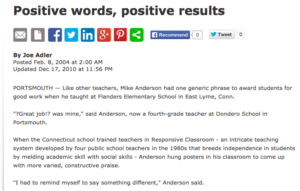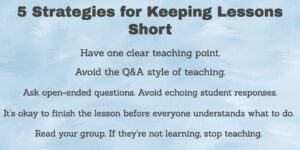Positive words, positive results – Seacoast Online
Original Article: http://www.seacoastonline.com/article/20040208/NEWS/302089982
 PORTSMOUTH — Like other teachers, Mike Anderson had one generic phrase to award students for good work when he taught at Flanders Elementary School in East Lyme, Conn.
PORTSMOUTH — Like other teachers, Mike Anderson had one generic phrase to award students for good work when he taught at Flanders Elementary School in East Lyme, Conn.
“‘Great job!’ was mine,” said Anderson, now a fourth-grade teacher at Dondero School in Portsmouth.
When the Connecticut school trained teachers in Responsive Classroom – an intricate teaching system developed by four public school teachers in the 1980s that breeds independence in students by melding academic skill with social skills – Anderson hung posters in his classroom to come up with more varied, constructive praise.
“I had to remind myself to say something different,” Anderson said.
“A poster would say ‘I notice…’ or ‘I see…’ When a student showed me their work, I’d look up on the wall and say something like, ‘I notice you brought in your homework 10 out of 10 times!'”
Years later, Responsive Classroom is central to everything Anderson does as a teacher. Other teachers in Portsmouth are joining him in adopting the approach, which he says “gets students excited about coming to school.”
The benefit of giving specific praise as opposed to blind praise, Anderson said, is that children associate blanket judgments like “good boy” or “good job” with earning an adult’s approval. Responsive Classroom trains teachers to focus on the work being done, not the child, so students are not constantly in need of positive re-enforcement.
“I don’t want my kids to think that they will lose my approval if they do something wrong,” Anderson said.
Responsive Classroom covers all areas of the school day, including how students greet each other in the morning; how the classroom is arranged to foster a warm atmosphere and kept clean to avoid a mess at the end of the day; disciplining students; and presenting information in school assignments.
“It would take weeks to explain everything that (Responsive Classroom) does,” Anderson said.
The teacher, who is a consultant for the Northeast Foundation for Children that developed the technique, has passed the technique down to other teachers at Dondero and some have learned it other ways.
On Thursday, Anderson is leading his class in the morning greeting. The students elect the “windshield wiper greeting” from a list of choices hanging on a wall, and proceed to greet each other with arm motions akin to windshield wipers.
Some parents and teachers who first hear about Responsive Classroom react skeptically, saying it feels like “Kum ba yah” and doesn’t really address academics, Anderson said.
But he added the academic benefits of the teaching system are remarkable. When students are given a safe, comfortable environment to work, where they develop their social skills in addition to academics, they thrive.
“It’s a way of teaching that combines social and academic instruction of the day with the idea that the higher social expectations you set, the higher academic standards they?ll attain,” Anderson said.
“It often looks like it’s just about the social skills, but it’s all about teaching really high academics.”
In another exercise working on tying together concepts, Anderson tapes a card to the backs of the students. Some cards show a type of “intelligence” and some show a type of activity. Students pair up based on what “intelligence” they think is required for an activity. For example, if you were labeled with “logical intelligence,” you would pair up with a student labeled with “solving a mathematical equation.” If you were labeled “interpersonal intelligence,” you would find the student labeled with “conducting an interview.”
“The payoffs are that students love to come to school,” Anderson said. “And they’re learning really valuable social skills like empathy, cooperation and responsibility.”




